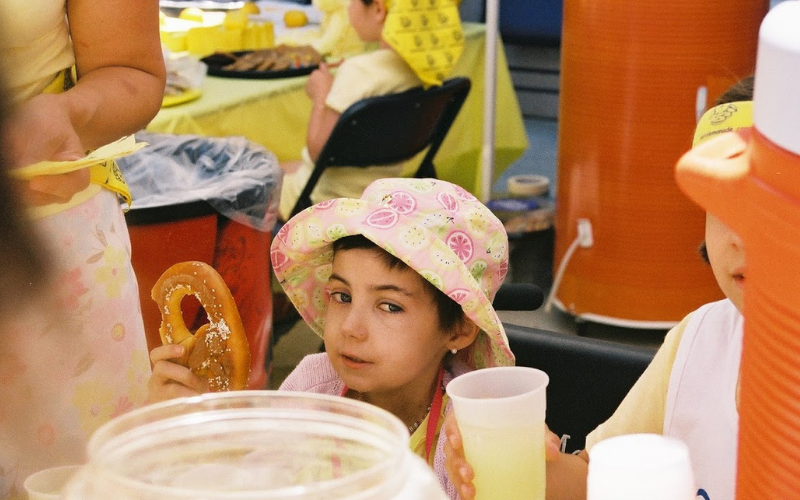By: Trish Adkins
Edie was just 5 months old when she began experiencing stomach pain. Her parents knew something wasn’t right and after a series of tests, Edie was diagnosed with stage 4 neuroblastoma. By the time she was 2 years old, Edie had been fighting neuroblastoma for over half her life and treatment wasn’t working.
Her cancer persisted. Out of options, Edie went to Children’s Hospital of Philadelphia (CHOP), an Alex’s Lemonade Stand Foundation (ALSF) Center of Excellence.
CHOP doctors tested Edie’s blood and found she was harboring a specific mutation called anaplastic lymphoma kinase (ALK). ALK was driving Edie’s neuroblastoma. This finding made Edie eligible for a trial for a drug called crizotinib, led by ALSF-funded researcher Dr. Yael Mossé.
Crizotinib had been previously approved by the FDA for the treatment of ALK-driven lung cancers in adults. The drug was delivered in a pill form, as opposed to the IV-delivered chemotherapy that Edie previously had to endure. Also unlike chemotherapy: the side effects of crizotinib were minimal and often disappeared within days of starting the protocol.
The trial worked. By December 2011, Edie was cancer-free. Later, her mother, Emily, would be diagnosed with same type of ALK-driven familial neuroblastoma and find her cure in a therapy that included crizotinib.
Edie turns 13 years old this June, celebrating more than 10 years of survivorship. Because of ALSF's support of the research into crizotinib, Edie is able to celebrate without the long-term side effects that years of high-dose chemotherapy and radiation can bring.
But the story doesn’t stop with Edie.
Cures for other types of neuroblastoma.
Crizotinib is not effective for all types of neuroblastoma. While Edie and her mother both had familial neuroblastoma and harbored ALK in their genes, Dr. Mossé discovered that many kids with this neuroblastoma had tumors that were positive for the ALK mutation, even if the children themselves were not.
Working with her team and using additional grant funding from ALSF, Dr. Mossé discovered that a drug called lorlatinib was the only ALK inhibitor effective against neuroblastoma that expressed the ALK mutation. Dr. Mossé led the Phase 1 trial for the drug in the New Approaches to Neuroblastoma Therapy (NANT) Consortium.
Patients in the trial showed positive responses to lorlatinib and minimal side effects, allowing kids in treatment to live more normal lives despite having cancer. As Dr. Mossé continued to move the trial forward, Liz and Jay Scott, parents of ALSF Founder, Alex Scott, decided to have Alex’s tumor tested.
Alex, who died in 2004 at the age of 8, battled neuroblastoma for nearly her entire life. Chemotherapy, radiation, MIBG and other treatments left their mark — leaving Alex with harsh side effects, taking away her hair and causing her constant pain.
A piece of Alex’s tumor was tested in late 2021, revealing that Alex’s neuroblastoma was ALK-positive.
If Alex was diagnosed today, her story could have been different.
Safer treatments, funded by lemonade stands.
Through her treatments, Alex always believed that research could help kids just like her. Her first lemonade stand was the manifestation of that belief — she raised $2,000 to help doctors make kids feel better. That lemonade stand kicked off a movement to cure all types of childhood cancer.
And, now, Alex’s dream feels closer than ever.
Lorlatinib, the drug that treats neuroblastoma tumors with an ALK mutation, is now being tested in a Children’s Oncology Group (COG) Phase 3 trial as an up-front treatment for children. Used in conjunction with chemotherapy, this treatment could substantially improve chances of a cure for children with high-risk neuroblastoma whose tumors harbor an ALK alteration and
do so with reduced short- and long-term side effects. This trial is open at the more than 240 COG sites across the United States.
This Phase 3 trial is the last stop before FDA and EMA registration — bringing more cures to more children, everywhere, just like Alex wanted.
Updated:
May 31, 2024
First Published:



